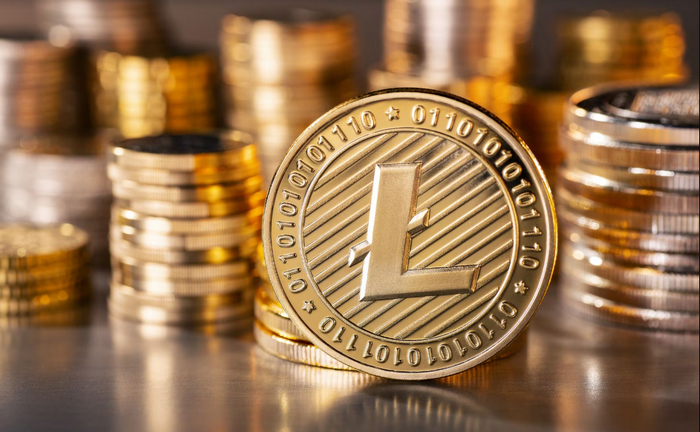-
 Bitcoin
Bitcoin $83,313.6693
-1.61% -
 Ethereum
Ethereum $1,824.6416
-3.06% -
 Tether USDt
Tether USDt $0.9999
0.00% -
 XRP
XRP $2.0615
-1.92% -
 BNB
BNB $601.0287
-0.09% -
 Solana
Solana $119.7880
-4.08% -
 USDC
USDC $0.9999
-0.01% -
 Dogecoin
Dogecoin $0.1661
-3.40% -
 Cardano
Cardano $0.6510
-3.65% -
 TRON
TRON $0.2380
-0.22% -
 Toncoin
Toncoin $3.7959
-5.14% -
 UNUS SED LEO
UNUS SED LEO $9.3951
-0.16% -
 Chainlink
Chainlink $13.1588
-4.27% -
 Stellar
Stellar $0.2636
-1.98% -
 Sui
Sui $2.4047
1.82% -
 Avalanche
Avalanche $18.6850
-3.03% -
 Shiba Inu
Shiba Inu $0.0...01235
-0.22% -
 Hedera
Hedera $0.1650
-0.75% -
 Polkadot
Polkadot $4.0373
-1.82% -
 Litecoin
Litecoin $83.5682
0.58% -
 MANTRA
MANTRA $6.4443
3.75% -
 Bitcoin Cash
Bitcoin Cash $303.2630
-0.75% -
 Bitget Token
Bitget Token $4.5497
-1.20% -
 Dai
Dai $1.0000
0.00% -
 Ethena USDe
Ethena USDe $0.9998
-0.01% -
 Pi
Pi $0.6605
-4.81% -
 Hyperliquid
Hyperliquid $12.4411
-6.29% -
 Monero
Monero $216.2784
-1.00% -
 Uniswap
Uniswap $6.0092
-2.13% -
 Aptos
Aptos $5.2761
-0.41%
Detailed tutorial on buying, selling and trading LTC (with pictures and text)
Litecoin, often called "silver to Bitcoin's gold," offers faster and cheaper transactions, making it a preferred choice for many users.
Oct 06, 2024 at 08:53 pm

How to Buy, Sell, and Trade Litecoin (LTC)
Litecoin is a peer-to-peer cryptocurrency that is open source and decentralized. It was created in 2011 by Charlie Lee, a former Google engineer, and is based on the Bitcoin protocol. Litecoin is often referred to as the "silver to Bitcoin's gold" because it is faster and cheaper to use than Bitcoin.
Here is a step-by-step guide on how to buy, sell, and trade Litecoin:
1. Choose a Litecoin wallet
The first step is to choose a Litecoin wallet. There are many different Litecoin wallets available, so it is important to do your research and choose one that is right for you. Some popular Litecoin wallets include:
- Exodus
- Jaxx
- Trezor
- Ledger Nano X
2. Buy Litecoin
Once you have chosen a Litecoin wallet, you can purchase Litecoin using a variety of methods, including:
- Exchanges: You can buy Litecoin on exchanges such as Coinbase, Binance, and Kraken.
- Peer-to-peer marketplaces: You can buy Litecoin from other people on peer-to-peer marketplaces such as LocalBitcoins and Paxful.
- ATMs: You can buy Litecoin at ATMs in some countries.
3. Sell Litecoin
If you want to sell your Litecoin, you can do so on the same exchanges and peer-to-peer marketplaces where you bought it. You can also sell Litecoin to other people in person.
4. Trade Litecoin
You can trade Litecoin for other cryptocurrencies on exchanges such as Binance and KuCoin. You can also trade Litecoin for fiat currencies on exchanges such as Coinbase and Kraken.
5. Store Litecoin
Once you have purchased Litecoin, you need to store it in a secure wallet. There are many different types of Litecoin wallets available, so it is important to choose one that is right for you. Some popular Litecoin wallets include:
- Hardware wallets: Hardware wallets are the most secure way to store Litecoin. They are offline devices that store your private keys offline, making them inaccessible to hackers.
- Software wallets: Software wallets are less secure than hardware wallets, but they are easier to use. They are stored on your computer or mobile device and can be accessed online.
- Paper wallets: Paper wallets are a simple way to store Litecoin. They are simply printed out pieces of paper that contain your private keys.
Conclusion
Litecoin is a fast, cheap, and secure cryptocurrency that is a good investment for both beginners and experienced investors. By following the steps in this guide, you can easily buy, sell, and trade Litecoin.
Additional Tips
- When choosing a Litecoin wallet, consider the following factors: security, ease of use, and cost.
- When buying Litecoin, be sure to do your research and choose a reputable exchange or peer-to-peer marketplace.
- When storing Litecoin, be sure to choose a secure wallet that is right for you.
- Litecoin is a volatile asset, so be sure to invest only what you can afford to lose.
Disclaimer:info@kdj.com
The information provided is not trading advice. kdj.com does not assume any responsibility for any investments made based on the information provided in this article. Cryptocurrencies are highly volatile and it is highly recommended that you invest with caution after thorough research!
If you believe that the content used on this website infringes your copyright, please contact us immediately (info@kdj.com) and we will delete it promptly.
- Mutuum Finance (MUTM) Is One of the Top Solid DeFi Ventures, Alongside Pepe (PEPE) and Ethereum (ETH)
- 2025-04-03 13:15:13
- Mutuum Finance (MUTM) Surpasses $6 Million in Funding, With More Than 7,700 Holders Taking Their Positions Early
- 2025-04-03 13:15:13
- Bitcoin [BTC] Exchange Outflows Spike as Over 20,000 BTC Move to Market
- 2025-04-03 13:10:13
- Over 21,000 Bitcoins Transferred to Exchanges in the Last 96 Hours, Marking a Significant Spike in Exchange Reserves
- 2025-04-03 13:10:13
- Injective Protocol to Host Injective Builder Day in Seoul with Four Pillars on April 11th
- 2025-04-03 13:05:13
- STEPN to Launch a Major Update on April 3rd, Introducing New Ways to Play, Compete, and Rise to the Top
- 2025-04-03 13:05:13
Related knowledge

What is Ethereum’s Slashing mechanism and how to punish malicious behavior?
Feb 20,2025 at 03:08am
Key PointsOverview of slashingDifferent types of slashing in EthereumIncentives and consequences of slashingIdentifying and reporting slashed validatorsOngoing discussions and potential improvementsEthereum's Slashing Mechanism: Punishing Malicious BehaviorEthereum's slashing mechanism is an essential tool for ensuring network security and punishing mal...

What is the verifier node of Ethereum and how to become a verifier?
Feb 19,2025 at 06:00pm
The Verifier Node of Ethereum: A Comprehensive GuideKey Points:What is a Verifier Node?How to Become a Verifier NodeResponsibilities and Rewards of a Verifier NodeMinimum Requirements for Becoming a Verifier NodePotential Difficulties in Running a Verifier Node1. What is a Verifier Node?A Verifier Node is an independent entity on the Ethereum network th...

What is Ethereum’s staking, and how to participate and earn money?
Feb 19,2025 at 04:37pm
Key Points:Understanding Ethereum's Staking MechanismSteps to Participate in StakingBenefits and Rewards of StakingSecurity and Risk ConsiderationsTechnical Requirements and Hardware OptionsPotential Challenges and Troubleshooting TipsFAQs on Ethereum StakingWhat is Ethereum's Staking?Proof-of-Stake (PoS) is a consensus mechanism used in blockchain netw...

What is Ethereum’s DAO (Decentralized Autonomous Organization) and how does it work?
Feb 20,2025 at 03:12am
Key PointsDefinition and Structure of a DAOGovernance and Decision-Making in DAOsBenefits and Use Cases of DAOsChallenges and Limitations of DAOsWhat is Ethereum's DAO (Decentralized Autonomous Organization) and How Does It Work?Definition and Structure of a DAOA Decentralized Autonomous Organization (DAO) is an innovative governance and management fram...

What is Ethereum's multi-signature wallet and how to improve security?
Feb 20,2025 at 02:18pm
Key Points:Understanding the Concept of a Multi-Signature WalletBenefits and Drawbacks of Multisig WalletsRequirements for Setting Up a Multisig WalletStep-by-Step Guide to Generating a Multisig WalletImplementing Strategies for Enhanced Security1. Understanding the Concept of a Multi-Signature WalletA multi-signature (multisig) wallet in the Ethereum e...

What is Ethereum's oracle and how to provide data for smart contracts?
Feb 21,2025 at 01:30am
Key Points:Understanding the concept of oracles in EthereumExploring different types of oraclesDetailed guide on how to provide data for smart contractsAddressing potential challenges and considerationsWhat is Ethereum's Oracle?Oracles are crucial components in the Ethereum ecosystem, enabling smart contracts to access real-world data and off-chain even...

What is Ethereum’s Slashing mechanism and how to punish malicious behavior?
Feb 20,2025 at 03:08am
Key PointsOverview of slashingDifferent types of slashing in EthereumIncentives and consequences of slashingIdentifying and reporting slashed validatorsOngoing discussions and potential improvementsEthereum's Slashing Mechanism: Punishing Malicious BehaviorEthereum's slashing mechanism is an essential tool for ensuring network security and punishing mal...

What is the verifier node of Ethereum and how to become a verifier?
Feb 19,2025 at 06:00pm
The Verifier Node of Ethereum: A Comprehensive GuideKey Points:What is a Verifier Node?How to Become a Verifier NodeResponsibilities and Rewards of a Verifier NodeMinimum Requirements for Becoming a Verifier NodePotential Difficulties in Running a Verifier Node1. What is a Verifier Node?A Verifier Node is an independent entity on the Ethereum network th...

What is Ethereum’s staking, and how to participate and earn money?
Feb 19,2025 at 04:37pm
Key Points:Understanding Ethereum's Staking MechanismSteps to Participate in StakingBenefits and Rewards of StakingSecurity and Risk ConsiderationsTechnical Requirements and Hardware OptionsPotential Challenges and Troubleshooting TipsFAQs on Ethereum StakingWhat is Ethereum's Staking?Proof-of-Stake (PoS) is a consensus mechanism used in blockchain netw...

What is Ethereum’s DAO (Decentralized Autonomous Organization) and how does it work?
Feb 20,2025 at 03:12am
Key PointsDefinition and Structure of a DAOGovernance and Decision-Making in DAOsBenefits and Use Cases of DAOsChallenges and Limitations of DAOsWhat is Ethereum's DAO (Decentralized Autonomous Organization) and How Does It Work?Definition and Structure of a DAOA Decentralized Autonomous Organization (DAO) is an innovative governance and management fram...

What is Ethereum's multi-signature wallet and how to improve security?
Feb 20,2025 at 02:18pm
Key Points:Understanding the Concept of a Multi-Signature WalletBenefits and Drawbacks of Multisig WalletsRequirements for Setting Up a Multisig WalletStep-by-Step Guide to Generating a Multisig WalletImplementing Strategies for Enhanced Security1. Understanding the Concept of a Multi-Signature WalletA multi-signature (multisig) wallet in the Ethereum e...

What is Ethereum's oracle and how to provide data for smart contracts?
Feb 21,2025 at 01:30am
Key Points:Understanding the concept of oracles in EthereumExploring different types of oraclesDetailed guide on how to provide data for smart contractsAddressing potential challenges and considerationsWhat is Ethereum's Oracle?Oracles are crucial components in the Ethereum ecosystem, enabling smart contracts to access real-world data and off-chain even...
See all articles























































































